Related Research Articles

Dolichoderinae is a subfamily of ants, which includes species such as the Argentine ant, the erratic ant, the odorous house ant, and the cone ant. The subfamily presents a great diversity of species throughout the world, distributed in different biogeographic realms, from the Palearctic, Nearctic, Afrotropical region and Malaysia, to the Middle East, Australian, and Neotropical regions.
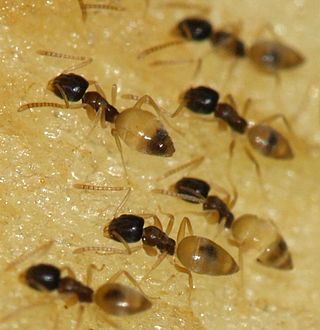
Tapinoma is a genus of ants that belongs to the subfamily Dolichoderinae. The genus currently comprises 74 described species distributed worldwide in tropical and temperate regions. Members of are generalized foragers, nesting in a wide variety of habitats, ranging from grasslands, open fields, woodlands, to inside buildings. The majority of species nest in the ground under objects such as stones or tree logs, other species build nests under bark of logs and stumps, in plant cavities, insect galls or refuse piles.

Iridomyrmex is a genus of ants called rainbow ants first described by Austrian entomologist Gustav Mayr in 1862. He placed the genus in the subfamily Dolichoderinae of the family Formicidae. It has 79 described species and five fossil species. Most of these ants are native to Australia; others are found in Asia and Oceania, and they have been introduced to Brazil, New Zealand, and the United Arab Emirates. Fossil species are known from China, France, and the United States.
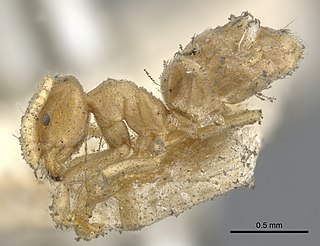
Chronoxenus is a genus of ants in the subfamily Dolichoderinae. The genus is known from Asia.
Iridomyrmex bicknelli is a species of ant belonging to the genus Iridomyrmex. The species is distributed in every single state and territory in Australia. Iridomyrmex bicknelli was described by Emery in 1898.

Chronoxenus myops is a species of ant of the genus Chronoxenus. It was described by Forel in 1895.
Chronoxenus walshi is a species of ant of the genus Chronoxenus. It was described by Forel in 1895, and was formerly a part of the genus Iridomyrmex. They are endemic to Bangladesh, India and China.
Chronoxenus dalyi is a species of ant of the genus Chronoxenus. It was described by Forel in 1895. The ant is endemic to Bangladesh, India, Nepal and China.

Leptomyrmecini is a tribe of Dolichoderinae ants with 16 genera and two extinct genera.

Iridomyrmex conifer is a species of ant in the genus Iridomyrmex. Endemic to Australia, it was described by Forel in 1902.
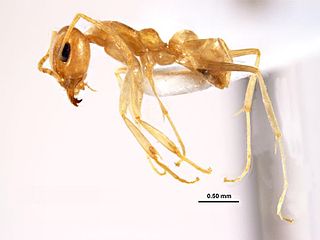
Iridomyrmex exsanguis is a species of ant in the genus Iridomyrmex. Described by Forel in 1907, the species is distributed nationwide in Australia.

Iridomyrmex hartmeyeri is a species of ant in the genus Iridomyrmex. Described by Forel in 1907, the ant is a nocturnal forager, and it distributed in most of Australia.
Iridomyrmex innocens is a species of ant in the genus Iridomyrmex. Described by Forel in 1907, the species is endemic to Australia, mainly confined in Western Australia, but the species is more common in areas with higher rainfalls within the Darling Ranges.
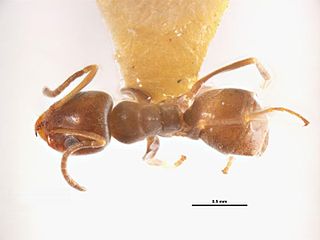
Iridomyrmex mjobergi is a species of ant in the genus Iridomyrmex. Described by Forel in 1915, the species is among the most common of the genus, endemic to all states and territories in Australia, and even extends into New Guinea. Workers are not usually aggressive, and they have been observed foraging for foods like nectar and honeydew.

Iridomyrmex obscurior is a species of ant in the genus Iridomyrmex. Described by Forel in 1902, the species is endemic to Australia.

Iridomyrmex rufoniger is a species of ant in the genus Iridomyrmex. It was described by Lowne in 1865. The species is endemic to Australia and introduced to several other countries.
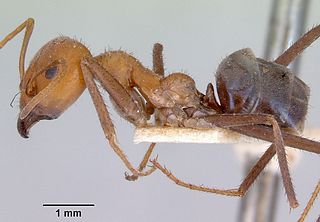
Iridomyrmex sanguineus is a species of ant in the genus Iridomyrmex. The ant is endemic to Australia and was described by Forel in 1910.
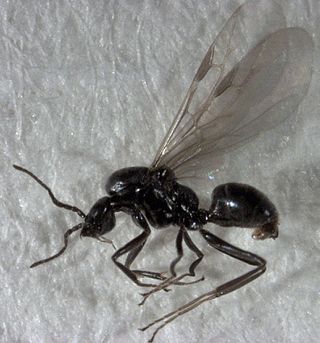
Iridomyrmex suchieri is a species of ant in the genus Iridomyrmex. Described by Forel in 1907, the species is endemic to Australia, but has also been recorded from New Zealand.
References
- ↑ Shattuck, Brian E. Heterick & Steve (2011). Revision of the ant genus Iridomyrmex (Hymenoptera : Formicidae) (PDF). Auckland, N.Z.: Magnolia Press. ISBN 978-1-86977-676-3 . Retrieved 2 January 2015.
- ↑ Bolton, B. (2014). "Chronoxenus wroughtonii". AntCat. Retrieved 3 January 2015.